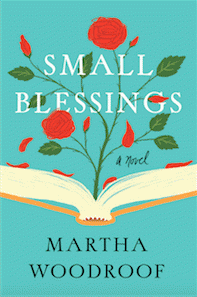Chatting with NPR Correspondent and First-Time Novelist, Martha Woodroof
My guest today is Martha Woodroof, NPR freelancer and author of Small Blessings.
JB: Welcome to OpEdNews, Martha. While this is your first novel, you're certainly no ingenue. According to your website, you've had a rather scattershot career trajectory. What compelled you to write a novel at this point in your life?
MW: You're right! I have my spent my life racketing around, both personally and professionally. I do think, however, that my adventures have had two abiding through-lines: a love of stories and a love of words.
Small Blessings may be the first novel I've published, but it is actually the third I've written -- meaning I'm one of those authors who taught herself to write book-length fiction by writing book-length fiction.
I think I only got good enough to publish by doing years of long-format freelance reporting for NPR on the subject of books and publishing.
At NPR, I worked with a couple of wondrous editors who taught me how to do the hard, disciplined thinking that goes into meaningful storytelling -- how to figure out exactly what the story is that you want to tell and then how to drive the narrative forward to the conclusion of that particular story. They also taught me the power of simple, precise language. If my writing is clear and vivid, the listener/reader will become engrossed in the story I'm telling rather than being distracted by the words I'm using to tell it.
Small Blessings got published because I made a bucket list in my early sixties. As I'd already had a lot of fun and done a lot of different stuff, that bucket list was one item long: Publish a novel!
I am nothing if not tenacious! And I'm also really, really lucky in that I got taken on by the redoubtable Kate Garrick of DeFiore & Co.
JB: Great opener, Martha, so many different ways we can go! Where to begin? Let's see. I agree that you lucked out with those editors at NPR who taught you so much about the craft of storytelling. At heart, Small Blessings is a story about love - not simply a love story, although it's that too, but a story about the different kinds of love. It's also pretty optimistic. Were you ever concerned that this, your first published novel, might come off as a bit sappy in an increasingly cynical society?
MW: In a word, no. I've always found cynicism to be an extremely limiting and pretty joyless stance, and cynics to be boringly predictable in their I-sneer-therefore-I-am take on almost everything.
In my experience, life is full of people handing out random acts of loveliness. Take, for example, the bus driver in Tempe, Arizona, where I went to do a story on baseball spring training. I hopped on, lugging my recorder, my microphone, and my usual giant purse. The driver took one look at me and said. "You're not from around here, are you?" I said, "No sir, I'm not." He pulled the lever to close the door, grinned up at me and said, "Well, young lady, you ride wherever you're going today for free!"
Sure, I've had real troubles and trainwrecks in my life, but they've mostly been self-inflicted. I'd rather learn from those troubles and trainwrecks than retreat behind the great wall of cynicism. Sappiness in novels to me is happy outcomes that are unsupported by character growth. What I want to write about is people who have the capacity to live fuller, happier lives and somehow find the guts to do it!
JB: And you did! You once managed a college bookstore coffee shop. Did you ever imagine that experience would resurface as the backdrop for a main character in your novel years later?
(Note: You can view every article as one long page if you sign up as an Advocate Member, or higher).







